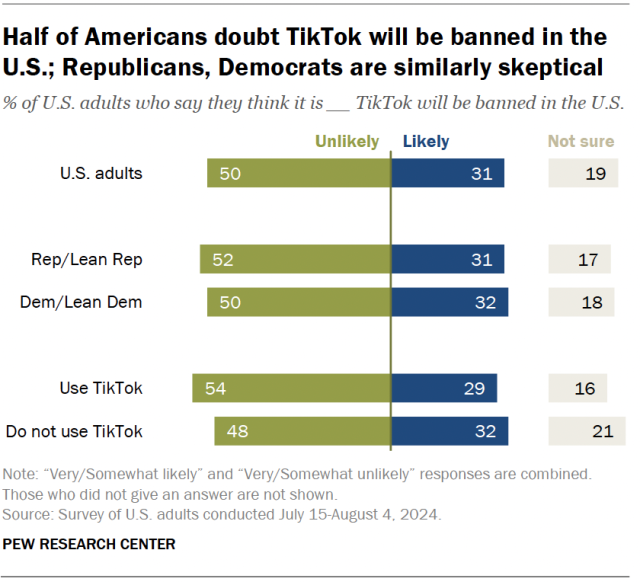☀️ Happy Thursday! The Briefing is your guide to the world of news and information. Sign up here!
In today’s email:
- Featured story: Meta’s changes to its fact-checking process
- New from Pew Research Center: 8 facts about Americans and TikTok
- In other news: A look at the app monitoring wildfires in the western U.S.
- Looking ahead: How should the press cover a second Trump presidency?
- Chart of the week: Will a TikTok ban happen? We asked Americans last summer
🔥 Featured story
Meta CEO Mark Zuckerberg recently announced major changes to the company’s content moderation policies ahead of Donald Trump’s second term as president. The company will end its third-party fact-checking program and rely on users to flag misleading or false information, similar to the policy on X (formerly Twitter). Meta also will end some restrictions on posts about topics like immigration and gender, and focus automated content moderation systems on “illegal and high-severity violations” such as terrorism and fraud.
Large majorities of news consumers on Facebook and Instagram say they at least sometimes see news there that seems inaccurate, according to a 2024 Pew Research Center survey. This includes a third of Facebook news consumers and a quarter of Instagram news consumers who say they see this extremely or fairly often.
In a 2023 Center survey, a majority of Americans (65%) supported tech companies taking steps to restrict false information online, even if it means limiting freedom of information. About eight-in-ten Democrats (81%) expressed this view, while about half of Republicans (48%) said the same. The share of Democrats who supported tech companies restricting false information increased substantially between 2018 and 2023.
🚨 New from Pew Research Center
Americans increasingly have been turning to the short-form video sharing platform TikTok – both in general and for news – even as the app faces an uncertain future in the United States.
Read eight key facts about Americans and TikTok, drawn from recent Pew Research Center studies.
📌 In other news
- A look at the app monitoring wildfires in the western U.S.
- Journalists and news outlets urge Apple to disable controversial AI news alerts
- In Canada, Google sends $100 million in exchange for exemption from the Online News Act
- New book reveals Trump camp received questions ahead of Fox News town hall, breaching journalism ethics
- X hires former WSJ editor to lead news team
- Florida jury to decide CNN defamation suit filed by Navy vet over Afghan withdrawal claims
- Journalists at The Athletic ask for voluntary recognition to join New York Times union
- Washington Post lays off workers in business division
📅 Looking ahead
As President-elect Donald Trump’s inauguration approaches, The Washington Post spoke to 10 influential journalists about how the news media should cover Trump’s second term. Ideas ranged from follow-up reporting on the promises Trump made on the campaign trail, to avoiding the trap of false equivalency in pursuit of objectivity, to simply covering his actions and policies as normal.
In 2017, a Center study examined how the news media covered the early days of the first Trump administration. Among the key findings:
- Among the top topics within coverage of the Trump administration were the president’s political skills (17% of stories), immigration (14%), presidential appointments and nominations (13%), U.S.-Russia relations (13%), and health care (9%).
- Four times as many stories had a negative assessment of the administration (44% of stories) as had a positive one (11%).
- One-in-ten stories refuted a statement by the Trump administration. Stories from news outlets with left-leaning audiences were more likely than those with right-leaning audiences to do this (15% vs. 2%).
📊 Chart of the week
As questions loom about TikTok’s fate in the United States, we look at Americans’ expectations regarding a potential ban.
In a summer 2024 survey, half of U.S. adults said they thought it was unlikely that TikTok would be banned in the U.S., while 31% said it was likely. Another 19% said they weren’t sure.

👋 That’s all for this week.
The Briefing is compiled by Pew Research Center staff, including Naomi Forman-Katz, Jacob Liedke, Sarah Naseer, Christopher St. Aubin, Luxuan Wang and Emily Tomasik. It is edited by Michael Lipka and copy edited by David Kent.
Do you like this newsletter? Email us at journalism@pewresearch.org or fill out this two-question survey to tell us what you think.